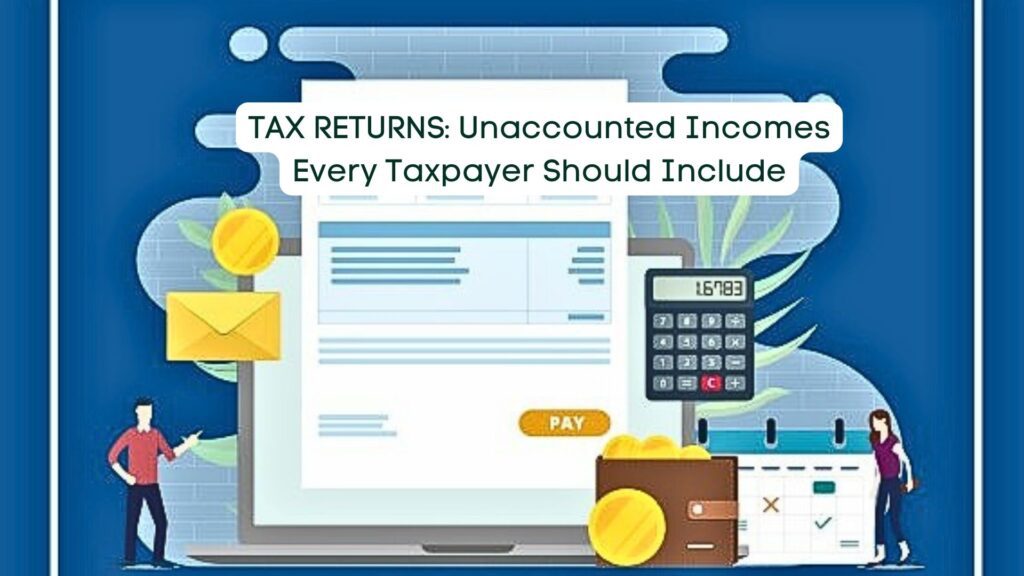
23 Feb TAX RETURNS: Unaccounted Incomes Every Taxpayer Should Include

In the process of filing Income Tax Returns (ITR), many individuals, both those employed and those retiring, often overlook certain sources of income, leading to inadvertent errors in their filings. Even professionals sometimes struggle to navigate the complexities of tax laws. This article aims to shed light on commonly missed sources of income that should be incorporated into tax returns.
Interest Income
A common misconception among taxpayers is that interest earned from bank and post office accounts is tax-exempt. However, interest from bank deposits, bonds, and various savings schemes is fully taxable. Even the interest accrued on savings account balances is subject to taxation and should be reported under “Revenue from other sources” in the tax return.
Tax Deducted at Source (TDS) is applicable if the interest paid or credited by a banking institution or post office exceeds Rs. 40,000 in a financial year. It’s crucial to note that the presence of TDS does not imply exemption from tax liability. All interest payments are reported to the tax authorities by the payer.
Another misconception is that if TDS has been deducted by the bank, no further tax is payable. However, TDS is typically set at 10% (or 20% if PAN is not provided), which might not cover the entirety of the taxpayer’s liability, especially if they fall under a higher tax bracket. It’s essential to cross-reference interest income with Form 26AS, which provides details of TDS deducted. In cases where interest income exceeds Rs. 40,000, taxpayers must collect Interest Certificates from their banks.
The interest income declared in the tax return must align with or exceed the information in Form 26AS to avoid triggering a tax notice. Additionally, certain interest incomes, such as those from tax-free bonds, Public Provident Fund (PPF), and Sukanya Samriddhi Yojana, are exempt from taxation but still need to be reported.
Rental Income
Income generated from renting out commercial or residential properties is taxable. After allowing for a 30% deduction from rental income, the remaining amount is taxable under the category of “income from property.”
However, interest paid on a loan for the purpose of purchasing, constructing, repairing, renovating, or reconstructing a home is eligible for deduction.
Capital Gains
Proceeds from the sale or purchase of assets such as shares, real estate, mutual funds, and jewelry are subject to taxation. Profits or losses from the sale of equity shares are categorized under “Capital Gains.” Short-term capital gains are taxed at 15%, while long-term gains exceeding Rs. 1 lakh attract a maximum tax rate of 10%. Losses from equity shares can be carried forward for up to eight years to offset future capital gains.
Gift Income
Income from gifts exceeding Rs. 50,000 is taxable under the Income Tax Act, unless specific exemptions apply, such as gifts received from relatives or during weddings.
Dividend Income
With the abolition of the dividend tax, dividends are now fully taxable in the hands of the recipient and should be reported under “Revenue from other sources.” Companies are required to deduct TDS at a rate of 10% on dividends exceeding Rs. 5,000 per year.
Conclusion
Including all sources of income in your ITR is crucial for accurate tax filings. By incorporating these often overlooked incomes, taxpayers can optimize their tax planning and ensure compliance with tax regulations. Don’t overlook these incomes in your income tax return and start afresh this year to maximize tax planning opportunities.


No Comments